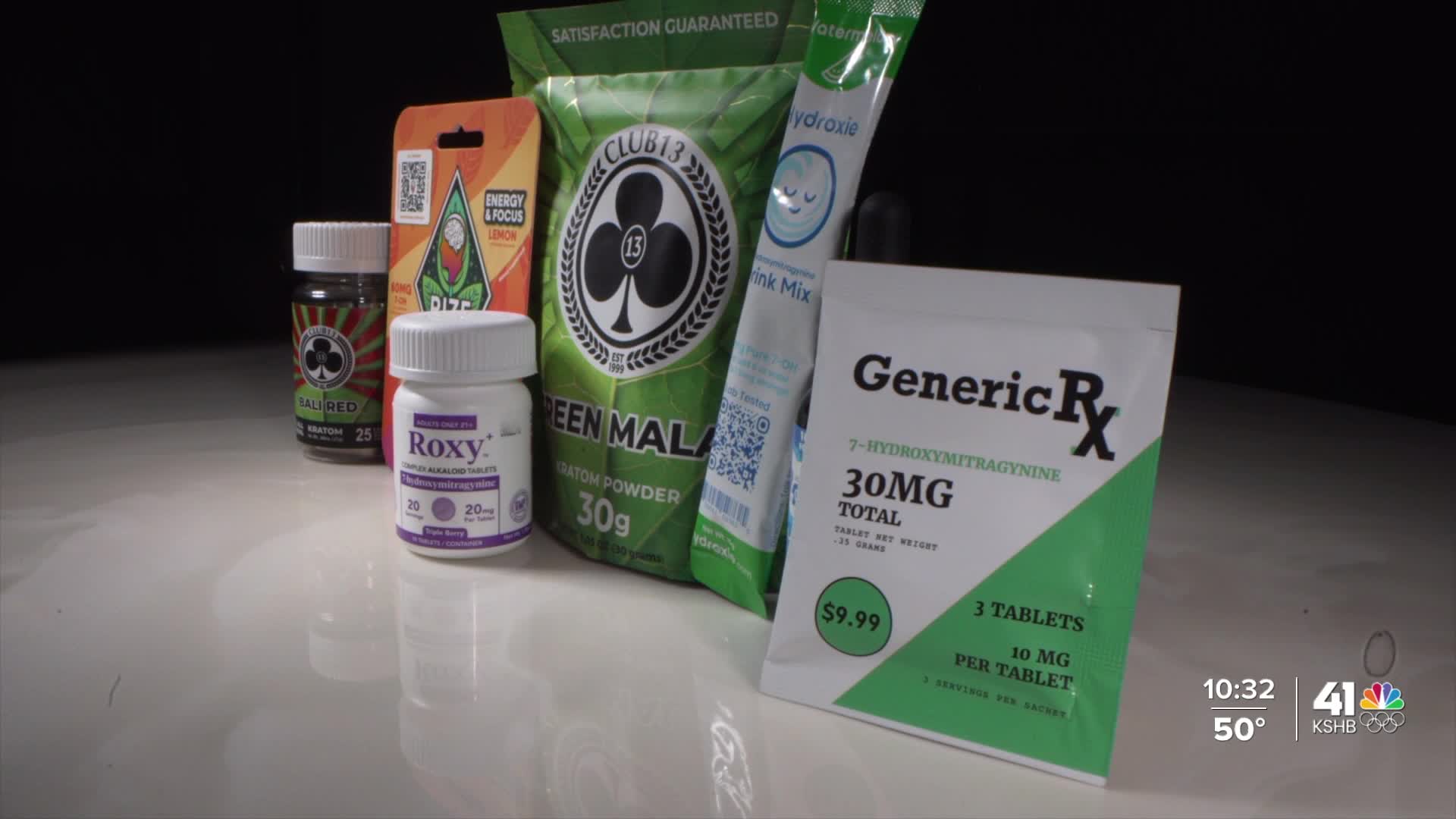KSHB 41 reporter Isabella Ledonne reports on stories in Overland Park, Johnson County and topics about government accountability. This is the third installment of the continuing series, Strong High Weak Laws, exploring kratom and 7-OH regulations in the Kansas City metro. Share your story idea with Isabella.
—
It's what some are calling gas station heroin. 7-hydroxymitragynine, or 7-OH, is a synthetic derivative of an herb known as kratom and has become widely popular in the Kansas City metro.
But as previously reported in Strong High Weak Laws, experts are growing increasingly concerned with the effects, comparing the high and withdrawal to heroin and fentanyl.
"Some studies indicate it's up to 25 to 40% more potent than morphine," University of Kansas Health System addiction psychiatrist Dr. Roopa Sethi said. "The effects are going to be very similar to an opiate."
Local experts like Sethi explained that 7-OH and kratom can be just as addictive as traditional opioids.

"I have a patient who has told me that they have used up to $1,600 a month trying to buy these 7-OH capsules from the street," Dr. Sethi said. "There is no regulation. They don't know how much to use."
Despite the concerns from local experts and health agencies, there are no federal regulations around kratom and 7-OH. The majority of states in the U.S. have some type of ban or regulation on kratom products, including 7-OH. However, Kansas and Missouri aren't one of them.
The Kansas City, Missouri, City Council is looking to be one of the first municipalities in the state to put stricter regulations on the drugs.
Now, Overland Park is joining the conversation of looking at 7-OH as an increasing drug trend. On both sides of the state line, you can see signs advertising 7-OH and kratom.
Addiction specialists at Healing House KC have been sounding the alarm on kratom and 7-OH for years.

"It is available everywhere, it's highly addictive and it's easy to misuse," founder and director Bobbi-Jo Reed said. "For something to be so freely distributed in our community breaks my heart because guess what? We get the disasters. We get the person who is so broken they don't feel that they can go on."
However, only in the last few months have the health departments of Missouri and Kansas put out warnings about the synthetic product 7-OH. Leaders in the kratom industry have also spoken up against concentrated 7-OH products.

"[Kratom] is a natural botanical; it hasn't been modified in any way," Global Kratom Coalition executive director Matthew Lowe said. "[The concentrated, synthetic 7-OH] industry is using the American population as a guinea pig for this novel substance."
7-OH concentrated synthetic products are not FDA-approved. The FDA has issued a warning advisory against the products and their marketing tactics.
American Shaman in the Kansas City metro is one of the largest producers of 7-OH. It hit the market a few years ago, marketed as a safe alternative to painkillers.

The founder of American Shaman, Vince Sanders, denied claims that there are serious issues with addiction to 7-OH.
“We did an addiction study with the beagles, and we didn't see anything,” Sanders said. "When you look at emergency room data, you look at poison control, there's no problem with 7-OH."
But the Missouri Poison Center received 47 reports involving kratom and 7-OH just from January to September 2025.

"So 7-OH hasn't had any human trials for regulations or anything like that?" KSHB 41 News reporter Isabella Ledonne asked.
"That is correct," Sanders responded. "The human trials have been people choosing to use it."
The FDA sent a warning letter to Sanders and American Shaman regarding the labeling and sales of 7-OH products. The federal agency is now taking steps to restrict "unsafe" 7-OH products.
The novelty and widespread accessibility of 7-OH can make it harder to regulate at the federal level. It has prompted action from local governments, such as KCMO and Overland Park, to address the issue.

"I'm not a chemist myself, but when you're making something 13 times more potent than morphine, that's a concern," KCMO councilman Nathan Willett said. "Where does it go on from here? There's zero regulation on it."
The Overland Park Police Department recently included 7-OH as an increasing drug trend in the community during a public safety presentation to city leaders. That presentation included the 2025 State Child Death Review Board Annual Report, in which Kansas Attorney General Kris Kobach outlined making it a priority for the 2026 legislative session to ban all sales of kratom products.
For advocates like Reed, any attempts at regulation are a win.
"Thank God, it's been a long time coming," Reed said. "It has ruined so many lives."
Kansas attempted to regulate kratom in 2023, and Missouri tried in 2025. Both measures of legislation failed and did not make it out of the legislative session.
KCMO's city manager has until the first week of December to identify kratom regulation plans in other municipalities and report back to city council.
"This [7-OH synthetic] derivative is so new, and we want to be proactive on this," councilman Willett said. "That's why we are going to try to be one of the first municipalities [to regulate it] within our state."
The KCMO Neighborhood Advisory Council will be discussing the public health warning for 7-OH at its upcoming meeting on Thursday, November 20.
—







